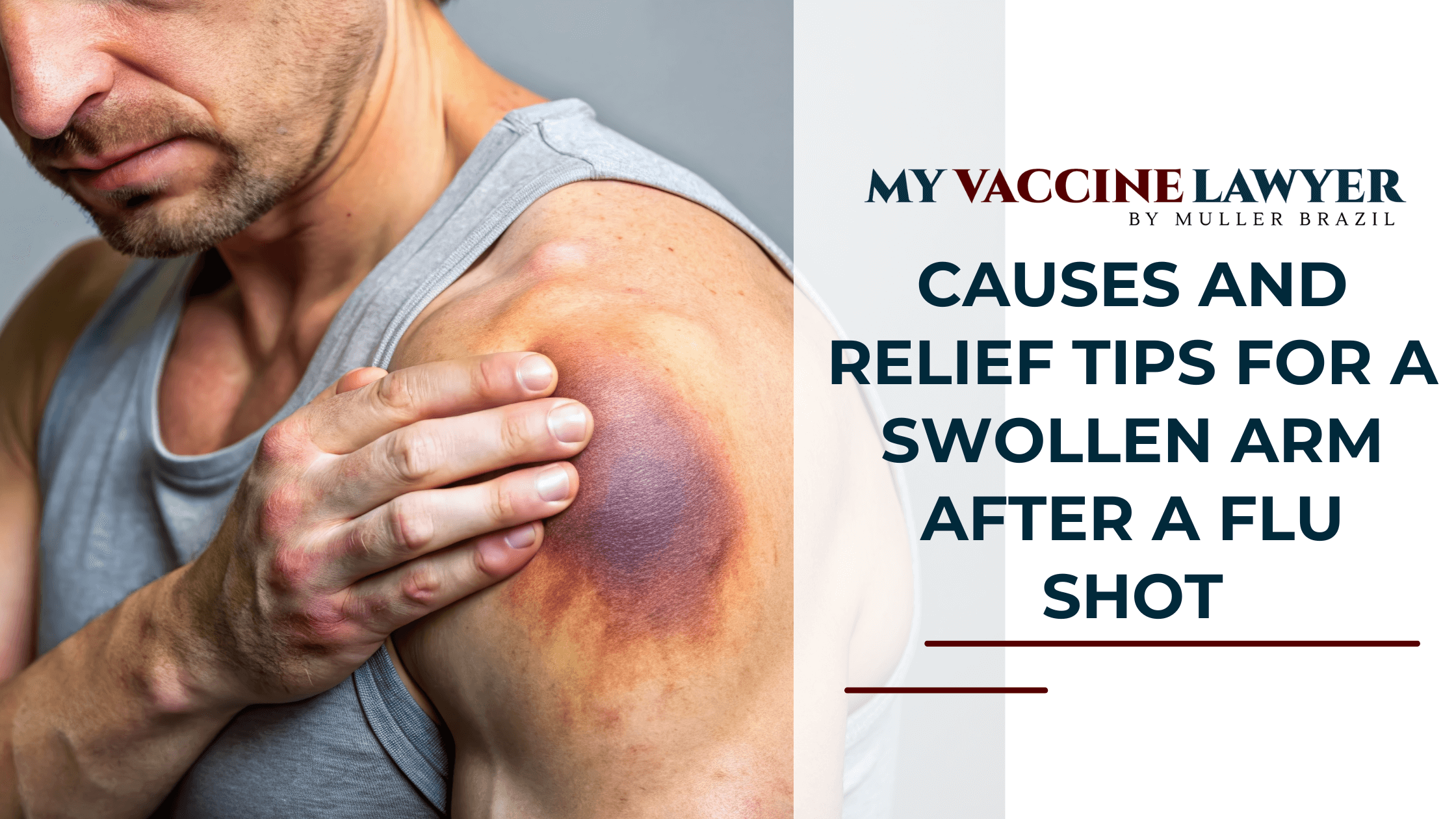Causes and Relief Tips for a Swollen Arm After a Flu Shot
Flu shots can cause arm swelling due to your body's immune response, but if the swelling worsens or persists, it may signal a more serious issue...
6 min read
Vaccine Injury Law Resources / Flu Shot / How to Relieve Flu Shot Side Effects Quickly and Easily
 Max Muller
:
Nov 21, 2022 10:00:00 AM
Max Muller
:
Nov 21, 2022 10:00:00 AM
To relieve flu shot side effects, start by applying a cold compress to the injection site right after getting the shot to reduce pain and swelling. After 24 hours, switch to a warm compress to help ease any remaining soreness. Additionally, moving your arm around gently through simple exercises like stretching or rotating can prevent stiffness and improve comfort.
For general side effects such as a mild fever or headaches, over-the-counter pain relievers such as acetaminophen or ibuprofen can help. Make sure to consult with your healthcare provider before taking these medications, especially if you have existing health conditions or are on other drugs. It's also important to rest well and drink plenty of fluids to help your body recover faster. These steps should help alleviate most symptoms within a few days.
If you're feeling under the weather after your flu shot, then don't worry; you're not alone. Up to 80% of people experience side effects after getting the flu shot, according to the Centers for Disease Control and Prevention (CDC).
While these side effects are usually mild and short-lived, they can be uncomfortable. You can do some things to relieve them and get back to feeling your best. This article will share tips and tricks to help you feel better after your flu shot.
Flu vaccines are important because they help protect you from the flu—a virus that can cause severe respiratory illness, hospitalization, and even death. Getting the flu shot is especially important for people at high risk of developing complications from the flu virus, such as:
Although the flu shot prevents the flu, some people may experience side effects ranging from mild to severe allergic reactions after vaccination. If the side effects are mild, they should disappear within a few days.
While the flu shot shields you from the influenza virus, sometimes your body's immune system might react to the vaccine, causing mild side effects. These temporary inconveniences shouldn't raise the alarm but indicate that your immune system is actively learning to fight the flu.
Let's explore the most common side effects. Common mild flu immunization side effects include:
Remember, while this section focuses on common and mild experiences, seeking medical advice from a healthcare provider is crucial if you encounter severe or concerning side effects.
While the flu shot is a valuable defense against the influenza virus, temporary side effects are sometimes part of the process. Let's explore gentle ways to ease these inconveniences and get you feeling your best again.
At the Injection Site:
Managing Discomfort:
Vaccinating your little one against the flu is vital, but understanding and managing potential side effects can ease concerns. While most reactions are mild and short-lived, here are some helpful tips:
Comforting the Injection Site:
Managing Aches and Discomfort:
Hydration and Rest:
While experiencing side effects after the flu vaccine can be a concern, they usually act like temporary houseguests, staying for a short visit before saying goodbye. Here's what to expect:
Most Common Scenario:
Extended Stays:
Remember:
Chest pain after a flu shot is a common side effect many people experience. It is caused by the body's immune response to the flu virus in the vaccine, which can cause inflammation and discomfort in the chest area.
The pain can range from mild to severe and last several days. Although chest pain after a flu shot can be uncomfortable, it is usually not a cause for concern and should subside on its own.
If the pain is severe or accompanied by other symptoms, such as shortness of breath or a rapid heartbeat, it is important to seek medical attention immediately.
Unfortunately, severe complications are not unheard of regarding the flu vaccination. Severe side effects are uncommon, but they underscore the importance of vigilance and awareness when considering any medical intervention, including vaccinations.
Individuals need to be informed about these small potential risks to seek medical attention promptly should any concerning symptoms arise after vaccination.
Some severe side effects from the flu shot include:
If you believe you have suffered a severe vaccine injury, seeking legal counsel is crucial to understanding your options and potential recourse. This decision is personal and should be made in consultation with qualified legal professionals. Contact My Vaccine Lawyer today for a free consultation.
While the flu shot is key to protecting ourselves and our communities from the influenza virus, some individuals may experience side effects. Fortunately, most of these are mild and temporary.
For local reactions such as soreness, redness, or swelling at the injection site, applying warm and cold compresses offers significant relief and helps reduce pain. Healthcare professionals advise that proper hydration, rest, and over-the-counter pain relief can also minimize discomfort.
For anyone who suspects they may have suffered a vaccine injury, it's important to know that you are not alone and that resources are available to support you. My Vaccine Lawyer specializes in providing legal assistance to individuals who have experienced adverse reactions to vaccines.
We encourage you to contact us if you believe you or a loved one has suffered from a vaccine injury. Our team of experts is dedicated to helping you understand your rights and explore your legal options. Contact My Vaccine Lawyer to ensure your case receives the attention and care it deserves.
Common side effects of the flu shot include soreness, redness, swelling at the injection site, low-grade fever, and aches. These side effects typically are mild and resolve on their own within a few days.
To relieve pain or discomfort, apply warm or cold compresses to the injection area to reduce swelling and soreness. Over-the-counter pain relievers, such as ibuprofen or acetaminophen, may also reduce pain and fever. Moving or gently exercising the affected arm can also help alleviate discomfort.
If you suspect a severe reaction or vaccine injury after receiving the flu shot, seek medical attention immediately. If your healthcare provider confirms a vaccine injury, you should consult with a legal expert specializing in vaccine injury cases. My Vaccine Lawyer is available to discuss your case, provide guidance, and help you understand your legal options.
Take Control of Your Injury Today
Mr. Muller currently devotes the majority of his law practice to aggressively fighting for the victims of unsafe drug and medical device injuries, as well as vaccine injuries and vaccine reactions involving the flu shot, TDaP/DTaP vaccine, and more. He has handled hundreds of SIRVA injury cases (shoulder injury related to vaccine administration), especially those involving bursitis, tendonitis, frozen shoulder, and rotator cuff tears. Mr. Muller also handles cases where vaccines caused serious nerve injuries such as Guillain-Barre Syndrome. Mr. Muller has recovered millions of dollars in compensation for his clients in the Vaccine Injury Compensation Program.

Flu shots can cause arm swelling due to your body's immune response, but if the swelling worsens or persists, it may signal a more serious issue...

The flu shot is one of the best ways to protect yourself from the flu virus, but what happens after you get vaccinated matters, too. While most...

A flu shot can make your arm sore due to muscle irritation and your immune response, but persistent pain could signal a more serious issue requiring...
